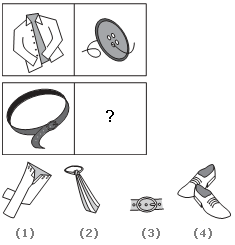Discussion
Home ‣ Logical Reasoning ‣ Statement and Argument See What Others Are Saying!
- Question
Statement: Should the tuition fees in all post-graduate courses be hiked considerably?
Arguments:
- Yes. This will bring in some sense of seriousness among the students and will improve the quality.
- No. This will force the meritorious poor students to stay away from post-graduate courses.
Options- A. Only argument I is strong
- B. Only argument II is strong
- C. Either I or II is strong
- D. Neither I nor II is strong
- E. Both I and II are strong
- Correct Answer
- Only argument II is strong
ExplanationA hike in fees is no means to make the students more serious in studies. So, argument I is vague. However, with the increase in fees, poor meritorious students would not be able to afford post-graduate studies. So, argument II holds. - 1. Choose the picture that would go in the empty box so that the two bottom pictures are related in the same way as the top two:

Options- A. 1
- B. 2
- C. 3
- D. 4 Discuss
- 2. Which word does NOT belong with the others?
Options- A. couch
- B. rug
- C. table
- D. chair Discuss
- 3. Which word does NOT belong with the others?
Options- A. eel
- B. lobster
- C. crab
- D. shrimp Discuss
- 4. 14 14 26 26 38 38 50
Options- A. 60 72
- B. 50 62
- C. 50 72
- D. 62 62
- E. 62 80 Discuss
- 5. All guilty politicians were arrested. Kishan and Chander were among those arrested.
Options- A. All politicians are guilty.
- B. All arrested people are politicians.
- C. Kishan and Chander were not politicians.
- D. Kishan and Chander were guilty. Discuss
- 6. Statement: Is caste-based reservation policy in professional colleges justified?
Arguments:
- Yes. The step is a must to bring the underprivileged at par with the privileged ones.
- No. It obstructs the establishment of a classless society.
- Yes. This will help the backward castes and classes of people to come out of the oppression of upper caste people.
Options- A. Only I and II are strong
- B. Only II is strong
- C. Only II and III are strong
- D. Only I and III are strong
- E. All are strong Discuss
- 7. Statement: 'Guests should be provided lunch.' - A tells B.
Assumptions:
- Unless told, lunch may not be provided.
- Guests will stay during lunch time.
Options- A. Only assumption I is implicit
- B. Only assumption II is implicit
- C. Either I or II is implicit
- D. Neither I nor II is implicit
- E. Both I and II are implicit Discuss
- 8. Which word does NOT belong with the others?
Options- A. dodge
- B. flee
- C. duck
- D. avoid Discuss
- 9. Statement: Should agriculture in rural India be mechanized?
Arguments:
- Yes. It would lead to higher production.
- No. Many villagers would be left unemployed.
Options- A. Only argument I is strong
- B. Only argument II is strong
- C. Either I or II is strong
- D. Neither I nor II is strong
- E. Both I and II are strong Discuss
- 10. 28 25 5 21 18 5 14
Options- A. 11 5
- B. 10 7
- C. 11 8
- D. 5 10
- E. 10 5 Discuss
More questions
Correct Answer: 3
Explanation:
A shirt is to a button as a belt is to a belt buckle. A button is used to close a shirt; a belt buckle is used to close a belt.
Correct Answer: rug
Explanation:
The couch, table, and chair are pieces of furniture; the rug is not.
Correct Answer: eel
Explanation:
The lobster, crab, and shrimp are all types of crustaceans; an eel is a fish.
Correct Answer: 50 62
Explanation:
In this simple addition with repetition series, each number in the series repeats itself, and then increases by 12 to arrive at the next number.
Correct Answer: Kishan and Chander were guilty.
Correct Answer: Only II is strong
Explanation:
Clearly, capability is an essential criteria for a profession and reservation cannot ensure capable workers. So, neither I nor III holds strong. However, making one caste more privileged than the other through reservations would hinder the objectives of a classless society. So, argument II holds strong.
Correct Answer: Both I and II are implicit
Explanation:
Since both I and II follow from the statement, so both are implicit.
Correct Answer: flee
Explanation:
Dodge, duck, and avoid are all synonyms meaning evade. Flee means to run away from.
Correct Answer: Only argument I is strong
Explanation:
Clearly, mechanization would speed up the work and increase the production. So, argument I is strong enough. Argument II is vague because mechanization will only eliminate wasteful employment, not create unemployment.
Correct Answer: 11 5
Explanation:
This is an alternating subtraction series with the interpolation of a random number, 5, as every third number. In the subtraction series, 3 is subtracted, then 4, then 3, and so on.
Comments
There are no comments.More in Logical Reasoning:
Programming
Copyright ©CuriousTab. All rights reserved.
